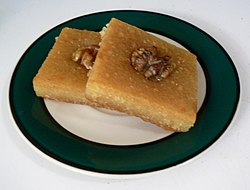Revani

Basbousa topped with walnuts
|
|
| Type | Dessert |
|---|---|
| Place of origin | Egypt |
| Region or state | Middle East, Horn of Africa, the Balkans |
| Main ingredients | Semolina or farina, syrup |
| |
|
Basbousa (Egyptian Arabic: بسبوسة, Turkish: revani or ravani) is a native Egyptian and traditional Middle Eastern sweet cake. It is made from cooked semolina or farina soaked in simple syrup.Coconut is a popular addition. The syrup may also optionally contain orange flower water or rose water.
Basbousa has many regional and dialect names (Arabic: بسبوسة basbūsah, هريسة harīsa, and nammoura (in Lebanon), Armenian: Շամալի shamali, Turkish: revani or ravani (from Persian), French: gabelouze, kalbelouz, and qualb-el-louz (in Tunisian French), Greek: ραβανί and ρεβανί).
It is found in the cuisines of the Middle East, the Balkans and the Horn of Africa under a variety of names. In southern Greece, it is called ravani, while in the north, it is called revani. Basbousa is often called "hareesa" in Jordan, the Maghreb, and the Egyptian city of Alexandria. Basbousa is a particularly popular dessert among the Egyptian Coptic Christians for fasts, such as Great Lent and the Nativity Fast as it can be made vegan.
...
Wikipedia
